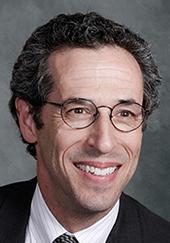
Andrew D. Leavitt, MD
UCSF
Laboratory Medicine, Box 0100
513 Parnassus Avenue, Room S-561B
San Francisco, CA 94143
United States
- Biomedical Sciences Graduate
- Developmental and Stem Cell Biology
- Hematologic Malignancies
- UCSF Cancer Center
Activities in my research laboratory focus on the role of MPL signaling in megakaryocytopoiesis and hematopoietic stem cell (HSC) biology. This includes studies of the role of signaling through Raf kinase family members; Raf family members play a critical role in the classic MAP kinase pathway, an important component of MPL signaling. We have identified multiple rolls for B-Raf signaling in myelopoiesis, and are now exploring its role in myeloid malignancies. We are also interested in generating human hematopoietic stem cells from human embryonic stem cells, with a particular interest in the role of miRNAs in this process. To help this project we are developing hESC reporter cell lines using gene knock-in approaches to help improve directed HSC development. The clinical BMT laboratory participates in a wide range of clinical trials as part of the UCSF adult hematopoietic malignancies/transplant program.
- Kerrigan SW, Gaur M, Murphy R, Shattil SJ, and Leavitt AD. Caspase-12 expression in murine megakaryocytes requires NF-E2 and contributes to integrin IIb 3 signaling in platelets . Blood 104:381-96, 2004.
- Kamata T, Kang J, Lee TH, Wojnowski L, Pritchard CA, Leavitt AD. A critical function for B-Raf at multiple stages of myelopoiesis. Blood 106:833-40, 2005.
- Gaur M, Kamata, T, Wang S, Moran B, Shattil SJ, Leavitt AD. Megakaryocytes derived from human embryonic stem cells: a genetically tractable system to study megakaryocytopoiesis and integrin function. J Throm Haemost. 4:436-42, 2006.
- Nicholas CR, Gaur M, Wang S, Reijo Pera RA, Leavitt AD. A method for single-cell sorting and expansion of genetically modified human embryonic stem cells. Stem Cells and Development 16:109-17, 2007.
- King F, Ritner C, Liszewski W, Kwan HCK, Petersen A, Leavitt AD, Bernstein BS. Subpopulations of human embryonic stem cells with distinct tissue-specific fates can be selected from pluripotent cultures. Stem Cells and Development 18(10):1441, 2009.